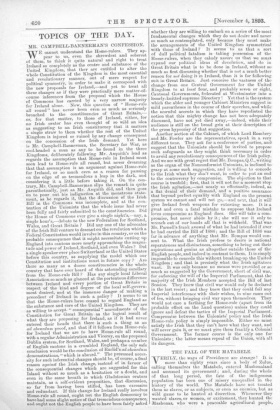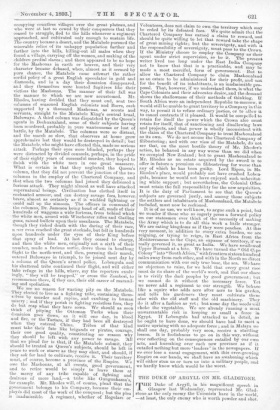THE FALL OF THE MATABELE.
VERILY, the ways of Providence are strange ! It is more than eighty years since a body of Zulus, calling themselves the Matabele, entered Mashonaland and assumed its government ; and, during the whole of that long period, the fate of the indigenous population has been one of misery unequalled in the history of the world. The Matabelo have not treated them as slaves, or as subjects, or even as enemies, but as wild game to be hunted at discretion. Whenever they wanted slaves, or women, or excitement, they hunted the Mashonas, who were a peaceable agricultural people, occupying countless villages over the great plateau, and who were at last so cowed by their conquerors that they ceased to struggle, fled to the hills whenever a regiment approached, and cultivated only enough to sustain life. The country became a desert, and the Matabele pursued the miserable relics of its unhappy population farther and farther into the hills, killing-out all males when they found a village, carrying off the women, and making of the children predial slaves ; and there appeared to be no hope for the Mashonas in earth or heaven, and their very character became debased, when, almost as it seemed by pure chance, the Matabele came athwart the rather sordid policy of a great English speculator in gold and diamonds, and iu a day their dominion disappeared, and they themselves were hunted fugitives like their victims the Mashonas. The manner of their fall was the manner to which we are now accustomed. Mr. Rhodes, having decided that they must end, sent two columns of seasoned English colonists and Boers, each supported by a thousand Mashonas, as scouts and servants, straight to the Matabele King's central kraal, Buluwayo. A third column was dispatched by the Queen's agents in Bechuanaland, some of their subjects having been murdered, probably in pure wantonnesas or lust of battle, by the Matabele. The columns were so distant, and the march so slow, that observers at home grew apprehensive lest they would be destroyed in detail ; but the Matabele, who might have effected this, made no serious attack. Perhaps their eyes were blinded, perhaps they were distracted by divided counsels, perhaps, in the pride of their eighty years of successful murder, they hoped to finish with the white men in one great massacre. What is certain is that they neglected the Queen's column, that they did not prevent the Junction of the two columns in the employ of the Chartered Company, and that when the two columns had joined they delivered a furious attack. They might almost as well have attacked supernatural beings. Civilisation has clothed itself in enchanted armour, and can destroy savage foes, however, brave, almost as certainly as if it wielded lightning or could call up the simoom. The officers in command of the columns, Dr. Jameson being head of all, made of their hundreds of waggons a wide fortress, from behind which the white men, armed with Winchester rifles and Gatling guns, rained bullets upon their assailants. The Matabele, though they risked death with the daring of their race, n;ver even reached the great stockade, but fell in hundreds upon hundreds under the eyes of their King before that spray of lead. At last they ceased to charge, and then the white men, originally not a sixth of their number, made a furious sortie, drove them in headlong flight to the north-west, and then, pursuing their march, entered Buluwayo in triumph, to be joined next day by a column of the Queen's armed police. Lobengula and his shattered tribe continued their flight, and will either take refuge in the hills, where, say the reporters exult- ingly, "they will he trapped," or cross the Zambesi, to recommence there, if they can, their old career of maraud- ing and spoliation. We see no reason for wasting pity on the Matabele. They elected to live as a fighting tribe, sustaining them. EQlves by murder and rapine, and exulting in human misery ; and if they perish in fighting resistless foes, they do but reap what they have sown. We should as soon think of pitying the Ottoman Turks when their dominion goes down, as it will one day, in blood and fire, or the Tartars, if they had been all destroyed when they entered China. Tribes of that kind must take their fate like brigands or pirates, courage, their one good quality, constituting no reason why they should be left with any power to ravage. 'All that we plead for is that, if the Matabele submit, they should be treated as Queen's subjects, should be left in peace to work or starve as they may elect, and should, if they ask for land to cultivate, receive it. Their territory must, of course, become a province of the Empire. We owe the Mashonas, at all events, good government, and to retire would be simply to leave them at the mercy of any tribe capable of fighting and desirous. of more land,—a tribe like Gungunhams.'s, for example. Mr. Rhodes will, of course, plead that the government belongs to his Company, because their em. ployds did most of the work of the conquest ; but the plea is inadmissible. A. regiment, whether of Regulars or Volunteers, does not claim to own the territory which may be ceded by its defeated foes. We quite admit that the Chartered Company has earned a claim to reward, and should be quite willing to let that reward take the shape of great mining rights ; but the sovereignty, and with it the responsibility of sovereignty, must pass to the Crown. If the Ministry choose to employ the Company as their agent under strict supervision, so be it. The present. writer lived too long under the East India Company not to know that that is a practicable, and may be made a most merciful, form of government. But to allow the Chartered Company to claim Mashonaland as an estate to be administered for their profit, and not for the benefit of its inhabitants, is an inadmissible pro- posal. That, however, if we understand them, is what the Cape Colonists and their advocates desire, and the demand shows the shallowness of their methods of thinking. If South Africa were an independent Republic to-morrow, it would still be unable to grant territory to a Company in this way, to permit it to refuse ordinary justice, or to allow it to cancel contracts if it pleased. It would be compelled to retain for itself the power which the Crown also must retain for itself, that of sanctioning and disallowing laws and projects, and that power is wholly inconsistent with the claim of the Chartered Company to treat Mashonaland as its own. We do not accuse the Chartered Company of filibustering ; and with our view of the Matabele, do not see that, on the most hostile theory of Mr. Rhodes's action, he behaved in any way worse than we did when we occupied New Zealand ; but to grant Mashonaland to Mr. Rhodes as an estate acquired by the sword is to offer in future a premium on filibustering far worse than any of which he has been guilty. Lord Ripon, in Mr. Rhodes's place, would probably not have crushed Loben- gula, because he would not have enjoyed such unhesitat- ing white support ; but nevertheless, the Colonial Office must retain the full responsibility for the new acquisition. It is the duty of Parliament to see that the Queen's subjects are governed justly, and among those subjects the settlers and inhabitants of Mashonaland, the Matabele included, must now be reckoned.
It is of no use, we well know, to argue such a point, but we wonder if those who so eagerly press a forward policy on our statesmen ever think of the necessity of making the Army which is to do all this work a little stronger. We are eating kingdoms as if they were peaches. At this very moment, in addition to every extra burden, we are reigning, or trying to reign, in East Africa from the Mediterranean to the Cape, an expanse of territory, if we really governed it, as great as India. We have swallowed Upper Burmah at a bite. We have turned the " Old Cape Colony " into "South Africa," with frontiers sixteen hundred miles away from each other, and with in the North no direct communication with our only true base, the sea. We have no objection to raise, for we hold that every great race must do its share of the world's work, and that our share is to vivify the dark peoples by good government; but we cannot do it without the necessary force. Yet we never add a regiment to our strength. We behave like a squire who adds acre after acre to his garden, and tells his gardeners they must cultivate these also with the old staff and the old machinery. They do it after a fashion as yet ; but some day the weeds will choke the vegetables. We are already running a most unwarrantable risk in keeping so small a force in Egypt. If Lobengula had attacked us in detail, as he ought to have done, we should have had to meet a native uprising with no adequate force ; and in Malaya we shall one day, probably very soon, receive a startling lesson. It is foolishness to go on in this way, without ever reflecting on the consequences entailed by our own i acts, and hurrahing over each new province as if it entailed nothing but more "leaders' in the newspapers. If we ever lose a naval engagement, with this ever-growing Empire on our hands, we shall have an awakening which will either stun us or turn us into a military people, and we hardly know which would be the worst.





















































 Previous page
Previous page